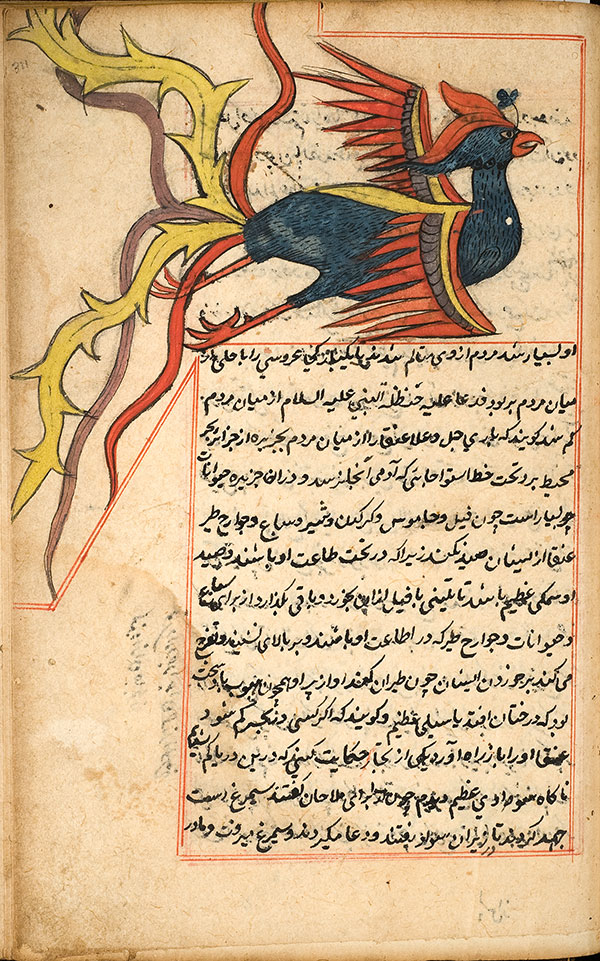“To a Phoenix”: A Poem from Azerbaijan

My poem “To a Phoenix” (below) was written with love. The narrator compares her love with the mythical phoenix, who comes to the rescue at the very last moment. According to legend, the character Malikmammad rescues the newly hatched phoenix nestlings from the mouth of a dragon. The phoenix arrives and, seeing him with the nestlings, thinks that Malikmammad plans to eat them. Quickly, the nestlings explain. Grateful, the bird gives Malikmammad one of its own feathers, saying that should the man ever need help, he should burn it. The phoenix will then come to save him.
Malikmammad then travels out of the world of dark into the world of light on the back of the phoenix. According to one version of the tale, Malikmammad takes with him forty pieces of meat and forty jars of water to sustain the bird during the trip. When the bird says “ga” he gives it water. When the bird says “gu” he feeds it meat. As they are about to reach the earth, a piece of meat falls to the ground. So Malikmammad cuts a piece of meat from his own leg and gives to the bird. When they land, the bird asks of Malikmammad the reason for his limp. Learning the cause, the bird reattaches the meat from its mouth to Malikmammad’s leg with its own saliva. The phoenix, thus, is a symbol of selflessness, love, and friendship.
In the poem, the woman, feeling coldness, even hostility from her beloved, reminds him, as the phoenix, of the good things they had once done for each other.
Translation from the Azerbaijani
By Alison Mandaville & Shahla Naghiyeva
Translator’s note: While similar, the phoenix in this poem is not identical to the mythical bird in Western legends. Literally translated, this mythical Asian and Turkic bird is called Zumrud (emerald bird), but because of the connection to fire, the bird is often translated as a phoenix.
Zümrüd Quşuna
by Rəbiqə Nazim qızı
Ətcə balalarını yerindən,
əjdahanı yemindən etmişdim, Zümrüd quşu.
Yuvanı tapmamışdım –
ovcumda saxlamışdım balalarını . . .
Körpə bədənlərindəki yüngül qızartı –
sığal yeri keçəcək,
Ana qucağında ağrıdan yox, sevgidən ağlayırlar,
"səsləri kiriyəcək . . .
İstəsən, bir də dolaşmaram yaşıl ağacların altında,
əjdahanı görəndə yüz ağaclığından keçərəm,
köçərəm quşların olmadığı yerlərə –
yəni kor ola bilərəm göy üzünə.
İstəmə . . .
Sən yenə qanadın üstündə qaranlıqdan çıxdığımı xatırla,
işığa dönmüşdün tükdən asılı günlərimdə,
“qu” deyəndə “qurban olum”,
“qa” deyəndə “qadan alım” söyləmişdim . . .
İndi alovlu ahlarını tökmə üstümə, Zümrüd quşu,
qəzəbli lələklərini lənət tək yağdırma başıma,
şimşək gözlərində sevməyə nəsə saxla . . .
Nəsə . . .
To a Phoenix
by Rabiqe Nazim qizi
The phoenix has deprived its nestlings of their home,
and the dragon of its fodder.
Unable to find the nest
I safeguard these chicks in my cupped palms.
The red flush of their small bodies
will fade when caressed, smoothed.
They cry not from pain, but from love;
and in their mother’s embrace,
their cries will hush.
I could cease my wandering under the green trees,
I could pass by the dragon as if it were a hundred forests away,
I could move to places without birds –
that is, I could be blind to the sky –
Don’t ask it of me.
Remember again how I escaped the darkness on your wings?
You turned my thread-hung days to light.
May I be a sacrifice to you, I replied to your cry for food.
May all your pain come to me, I said when you crowed thirstily.
Don’t pour out your flaming sighs upon me now, Phoenix,
don’t hurl your furious feathers, each a curse, to my head –
keep something of love in your lightning eyes, something.
Translation from the Azerbaijani
By Alison Mandaville & Shahla Naghiyeva













